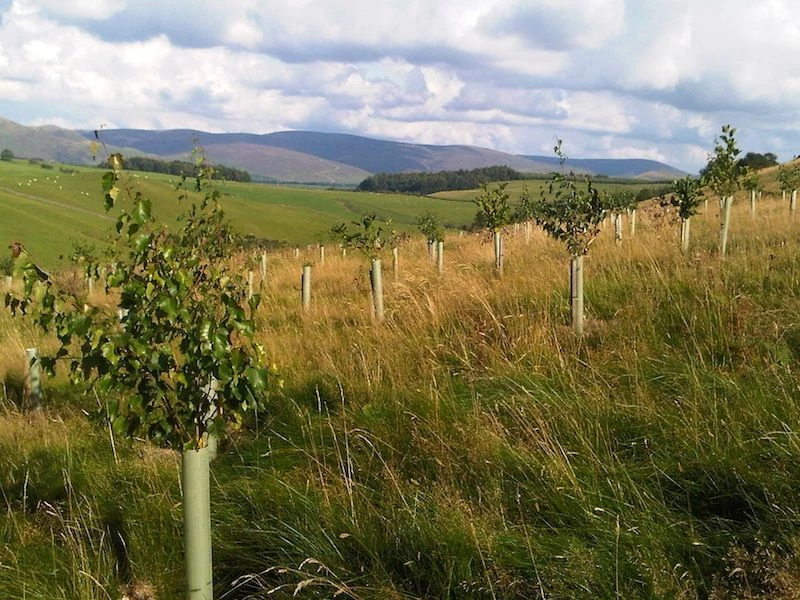
Partner Article
Could woodland creation be for your business?
It’s environment focus week on Bdaily, and we are looking at what the low-carbon economy really means for UK SMEs, as well as picking apart the nuts and bolts of adapting business to “go-green.“ Here, Stephen Prior, director of Forest Carbon Ltd, talks about how woodland sponsorship could be a route for businesses looking at their environmental strategy.
Many businesses spend time, and money, trying to deal with their carbon footprint. When considering how best to mitigate the environmental impacts of their operations they often find it hard to please everyone. A good mitigation plan should not only appeal to staff, customers and the bottom line, it should also fulfil two requirements: (a) it must demonstrate that, first and foremost, the businesses’ environmental impact is being reduced (e.g. by using energy more efficiently), and (b) it should show, convincingly, how the remaining, unavoidable impact can be ‘offset’.
Part (b) can be a tricky area, one where a disconnect between stakeholder and solution occurs, because for many years this action has usually involved investment in overseas carbon offset projects (for example, wind farms in China). Although such projects are worthy, and may demonstrate audit and accountability, they are too remote from UK business and customers to deliver any direct local benefit. Increasingly desirable are home-grown solutions, for instance the creation of new carbon woodlands in the UK to compensate for the carbon dioxide emissions that are produced here. This particular ‘offset’ option meets the requirements of being local, accessible, audited and tangible – and there are other benefits: trees scrub other pollutants from the air, provide recreational space, restore and protect ecosystems and significantly reduce flood risks. Everyone loves trees.
In the past the idea of sponsoring a carbon woodland as part of a company’s carbon management plan, whilst always seen as pleasant, was sometimes seen as unquantifiable, or unscientific. These days, however, there are official standards that regularise every aspect of tree projects. This shift has come about as the result of the launch of the government’s Woodland Carbon Code (WCC). UK carbon woodland schemes can now apply for WCC validation and achieving this certification will prove that the woodland is ‘additional’ (i.e. could not have existed without the intervention of the sponsoring business); that it has a positive biodiversity impact; that the right trees for the site are being planted; and that the CO2 capture projected is accurate. Based on forestry research and science as well as Kyoto Protocol principles, WCC validation covers all aspects essential to a credible environmental mitigation programme. To date there are 19 WCC certified woodlands in the UK – 17 of them developed and implemented by north-east based Forest Carbon Ltd – with another 58 awaiting audit (30 of which were developed by Forest Carbon). These new woodlands have been planted all over the UK for businesses large and small and the woodlands themselves
come in all shapes and sizes – ranging from 5 acres to 500 acres. The total projected CO2 capture of all these woodlands exceeds 1,000,000 tonnes – the equivalent of about 450,000 cars driving around for a year.
A typical example of the sort of project Forest Carbon is involved with would be the one currently underway in partnership with the Tweed Forum. Five new woodlands are being established in the Tweed catchment, with over 80,000 trees being planted. The woodlands will capture over 20,000 tonnes of CO2, and in the process much of the sort of major local damage caused by the 2008, 2009 and 2012 floods will be averted. Businesses involved in such projects can see how they represent a real contribution to the country and the environment, and only through the action they are taking on their environmental footprint are the trees being planted in the first place. It is the experience of participating companies that their staff warm to these projects, often getting involved in site visits, and that the company itself has also benefitted through their actions helping them to win new business. The best thing of all is that a tree does no harm in its making or its presence, and, with the advent of the Wood land Carbon Code, its work in cleaning up the air can now be properly measured and recognised.
Here are some other environment focus articles that may be of interest to you: carbon reporting in logistics firms; what are the benefits of electric vehicles?; we talk to a print business about why SMEs need to go green; find out how one innovative business is using ozone as a cleaning tool; what does sustainability really mean to your business?; funding support for green businesses; and a green adaptation case study.
This was posted in Bdaily's Members' News section by Steve Prior .
Enjoy the read? Get Bdaily delivered.
Sign up to receive our popular morning National email for free.








 Raising the bar to boost North East growth
Raising the bar to boost North East growth
 Navigating the messy middle of business growth
Navigating the messy middle of business growth
 We must make it easier to hire young people
We must make it easier to hire young people
 Why community-based care is key to NHS' future
Why community-based care is key to NHS' future
 Culture, confidence and creativity in the North East
Culture, confidence and creativity in the North East
 Putting in the groundwork to boost skills
Putting in the groundwork to boost skills
 £100,000 milestone drives forward STEM work
£100,000 milestone drives forward STEM work
 Restoring confidence for the economic road ahead
Restoring confidence for the economic road ahead
 Ready to scale? Buy-and-build offers opportunity
Ready to scale? Buy-and-build offers opportunity
 When will our regional economy grow?
When will our regional economy grow?
 Creating a thriving North East construction sector
Creating a thriving North East construction sector
 Why investors are still backing the North East
Why investors are still backing the North East